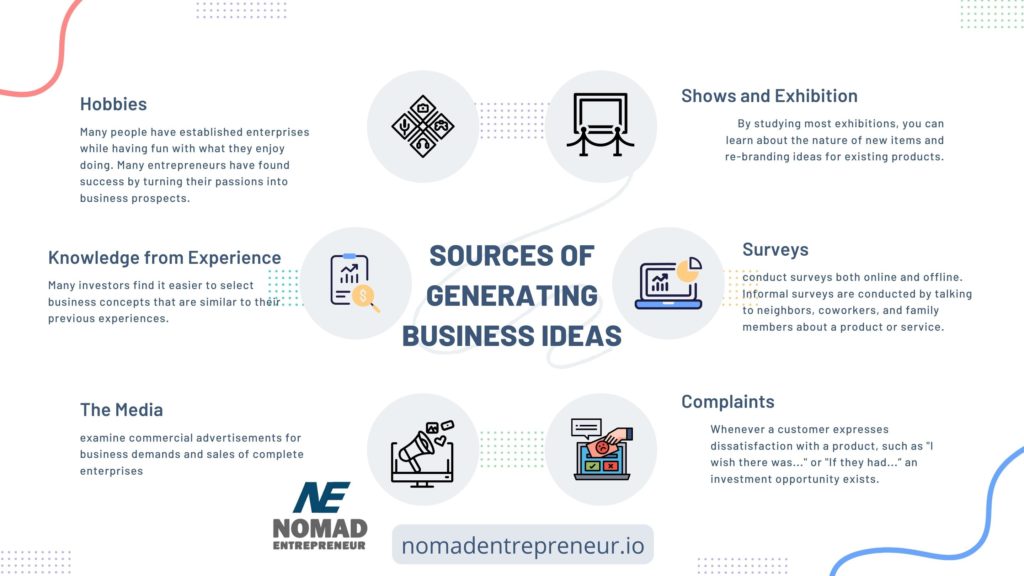You may establish your own hours; take as many tea breaks as you like, and work from anywhere, wearing whatever you want when you’re an entrepreneur. However, it must also cover its expenses.
That means you should think twice about quitting your job and starting your own business. Starting with the most fundamental of all questions: how can an entrepreneur generate business ideas?
This article is written to solve this question and a lot more similar.
How can an Entrepreneur Generate Business Ideas
The following are ten highlighted tips that answer the question “what are the methods of generating business ideas”:
Develop an inquiring mindset
Begin to be interested in and involved in what is happening in the world. Each day, set aside 30 minutes to read prominent blogs, news portals, or watch breaking news. Learn about newly founded startups and how they are progressing.
It will not take much time to become aware, but it will help you learn a lot about many sectors and technologies.
Pay attention to the issues
Business concepts that are successful handle real-world issues.
Discover the issues that people confront daily. Discuss your issues at work, in sports, with apparel, cuisine, and so on with family and friends. Consider your own set of issues and challenges. Is your life completely perfect? There are probably certain aspects of your life that you’d like to change or better. Consider the scenario.
Maintain a casual but focused attitude
You can scarcely build something truly successful when you feel compelled to generate business name ideas as soon as feasible and begin investing all of your efforts into this process
Simply relax, get more rest, and get a good night’s sleep. But take cognizance of what is going on around.
Do the following: Consider every event that occurs to you as a sign. Keep your focus and jot down what’s going on, including anything intriguing or weird that comes to mind throughout the day. After a week of practice, go through what you put down. Combine various concepts and ideas to determine whether they can aid in the creation of a future product or service.
Review prior concepts
When you can use tried-and-true ideas, why invent anything new?
Examine-in deeper details the ideas that have previously been implemented. Consider the potential for improvement and change.
Keep in mind, though, that you cannot simply copy someone else’s concept. In this case, it is unlikely to be successful. Find out what customers have to say about the present product or service by doing research. Figure out what’s missing and how you might improve this product.
Create a network
You’ll be able to flip from working hard to working smart if you have a strong network. Connecting with experts in your industry can provide you with not only a better grasp of your consumers’ needs but also a wealth of useful information from influencers and thought leaders.
Concentrate on making things easier for yourself
As a result of our efforts to make life easier, cheaper, and more convenient, a slew of amazing goods has emerged. And this is a fantastic strategy for developing new things.
- People adore anything that makes their jobs easier.
- What consumes the most of your time?
- Consider what you would like to make easier or faster.
Almost certainly, the answers will assist you in developing the next big idea. People are looking for conveniences and ways to save time. Make the most of it. Consider how you can make life more affordable.
Continue to read business books
Continuing to discuss the importance of books, I believe that good books are the best source of inspiration and knowledge. Reading can help you figure out where to begin!
Books can help you learn a lot of things, including new business ideas and how to put them into practice.
Acquire new skills
Take a chance on something extremely new from what you have done before.
New feelings and emotions encourage creativity when a person is exposed to uncommon circumstances. Change your focus away from your daily routine and toward something new you’ve always wanted to do. The new environment will cause your mind to consider all of the positives and negatives, as well as potential difficulties.
The online gurus and your loved ones can give you a consistent progression of information regarding business news and industry improvements.
Why every Successful entrepreneur needs a business mentor
Sources of Generating Business Ideas
Still on the subject matter of “how can an entrepreneur generate business ideas”, here are the sources by which business ideas can be generated:

Hobbies:
Many people have established enterprises while having fun with what they enjoy doing. Many entrepreneurs have found success by turning their passions into business prospects. For example, if you enjoy traveling, performing arts, or working in the hotel industry, you can consider launching a tourism-related firm. Sports, catering, cooking, piano playing, photography, and other money-making hobbies are some examples.
Knowledge from Experience:
Many investors find it easier to select business concepts that are similar to their previous experiences. This is because they are more knowledgeable about the terrain. In the world of entrepreneurship, more than half of all project ideas arise from work experiences.
The Media:
In the following ways, the media serves as a platform for the production and dissemination of business ideas:
- examine commercial advertisements for business demands and sales of complete enterprises
- gather data from reports on changes in fashions or consumer wants, such as healthy eating and weight loss
- Sift through classified ads for popular expertise, such as security, catering, and web design.
Shows and Exhibition:
By studying most exhibitions, you can learn about the nature of new items and re-branding ideas for existing products. You’ll be able to locate a gap to fill by interacting with salespeople, manufacturers, and end-users, and you’ll be able to establish your firm.
Surveys:
You can conduct surveys both online and offline. Informal surveys are conducted by talking to neighbors, coworkers, and family members about a product or service. The purpose of conducting surveys is to collect complaints from disgruntled customers of new and existing items so that you may develop ideas for fine-tuning your investment to include upgrades and modifications that the majority of people want to see.
Complaints:
Whenever a customer expresses dissatisfaction with a product, such as “I wish there was…” or “If they had…” an investment opportunity exists. You can either start a competing business with such companies, offering a better product, or sell the company your idea/product for improvement directly.
Come up with ideas (Brainstorming):
Brainstorming entails generating business ideas to solve challenges through creative thinking. The first stage is to identify an issue or a question, and then brainstorming is a strategy for addressing creative problems and coming up with fresh ideas for small businesses. The goal is to generate as many different solutions as possible.
Having your own business is good and fulfilling, and franchising assists you with limiting the dangers and expanding the profits. These are the reason why an entrepreneur chooses to launch a franchise.
Why Would An Entrepreneur Choose To Launch A Franchise
Generating Business Ideas from Existing Problems
Here are some other tips that will assist you to come up with business ideas from existing problems already solved.
It is little wonder that so many good ideas never even come to the attention of management. Or that so many die short of development–and miles from commercial success.
Innovation management
Disrupting Old Thought Processes
Anyone can become locked in particular “trains” of thought and succumb to groupthink. These concepts may be so comfy that we aren’t even aware that they are preventing us from moving forward! So, to come up with new ideas, we must break free from old thought patterns or processes and begin to recognize new possibilities.
Here are a few ideas:
Your Assumptions Should Be Tested
Every situation is likely to be accompanied by a set of assumptions. Many of them may turn out to be right, yet pushing your limits might lead to new and exciting chances.
Resolving the Issue
Your ability to be creative can be hindered by how you identify or view your situation. New answers can emerge if you explain the problem you’re trying to address differently or look at it from a different perspective.
Reverse Your Thoughts
Consider turning the scenario around if you’re having problems coming up with new ideas.
Mix and Match Your Media
When dealing with difficulties in novel ways, radical ideas can emerge. Applying various forms of creativity to your plans is a terrific method to do this – don’t just talk or write about them; explore them through music, painting, photography or whatever allows you refresh your head to express yourself. When you allow your creative juices to run, new ideas can arise.
Establishing New Relationships
Another method for generating new ideas is to make new and unexpected connections. Some of the best ideas appear almost by accident — you see or hear something completely unrelated to the problem you’re attempting to address and an awesome spark of idea drops in your head!
Forge innovative connections using some of the following strategies:
A collection of random words
Choose a word at random from any document and look for fresh connections to your problem.
Prompts with pictures
Images can be a powerful tool for stimulating creative ideas. Select any image, draw a shaky connection to your circumstance, and take note of any new options that appear.
Interesting things to look at
Request that each member of your team bring a little object to your next brainstorming session. You can generate fresh ideas by asking questions like “How is this thing related to the problem we’re trying to solve?” or “How can we use this object to help us reach our goal?”
Developing New Perspectives
Finally, you can boost the dynamism of your thought by stepping back from your regular perspective and looking at a problem with “new eyes.”
You’ll often gain an unexpected fresh viewpoint on a problem when you talk to someone with a different perspective, whether it’s due to their age, life experience, or cultural background.
Alternatively, play the “If I Were” strategy. Consider: “If I were…,” how would I approach this challenge? You may be a famous athlete, a great businessman, Abraham Lincoln, or anyone else!
Consider how the person you’ve chosen might handle the scenario and see if it gives you any new ideas.
How can Brainstorming Be used to generate business Ideas
Brainstorming is a systematic tool that will help you arrive at an awesome idea if perfectly utilized when analyzing “how can an entrepreneur generate business ideas”. The following are four steps to brainstorming small business ideas.

Begin your business brainstorming by letting your imagination run wild.
Take in as much information as you can about small businesses, businesses in general, and business trends to keep yourself motivated. If you have a specific industry in mind, learn everything you can about it. Do you wish to open a restaurant, for example? Then peruse periodicals and websites about the restaurant industry. In your neighborhood, go to a variety of restaurants. Check out nearby establishments’ competitors, such as bars, quick-service restaurants, food courts, and food trucks. Perhaps one of these will pique your interest more than a sit-down restaurant.
Come up with dozens of business ideas.
The final stage is to reduce them to a manageable number. Take the assistance of some friends, family members, or acquaintances to see what they think of your ideas. Find some unbiased people in the target market you’re contemplating (for example, sushi lovers) and ask them what they’d want to see in a business that caters to their sushi desires.
Consider companies that you admire, use, and rely on in your daily life.
What are the similarities and differences between these businesses? Perhaps you can’t live without Amazon since it simplifies your life. Perhaps you enjoy going to lunch at the local independent sandwich shop since the staff is always friendly and knows your order ahead of time.
Or maybe you just can’t get enough of that cute small boutique with one-of-a-kind presents for everyone on your list. Write down everything that comes to mind about why you admire these firms, whether it’s their exceptional customer service, unique products, or the way they truly “understand” what you want.
Consider the problems you’re dealing with in your own life.
What are the problems that often frustrate you daily? What do you wish you could perform more easily at work, at home, or in your spare time? You may have uncovered a business idea if enough other individuals think the same way you do.
Nine out of ten startups will fail. This is a hard and bleak truth, but one that you’d do well to meditate on. Entrepreneurs may even want to write their failure post-mortem before they launch their business.Why? Because very optimistic entrepreneur needs a dose of reality now and then. Cold statistics like these are not intended to discourage entrepreneurs, but to encourage them to work smarter and harder.
Forbes – By Neil Patel
Frequently asked Questions when generating business Ideas
Should I conduct a blind test of my business idea on total strangers?
To ensure that the items or services you propose to supply fulfill the needs or aspirations of your target clients, you must validate your business idea. This can be done in a variety of ways, including talking to family members or strangers to test the concept.
You must determine not just whether people enjoy your idea but also whether they will purchase the goods or services you propose to provide. Strangers are more likely than family members to give you an honest answer to this question.
What is the best way for me to put my business idea to the test?
The first step in evaluating a business’ idea is to determine whether you believe it meets a customer’s need or solves an issue. Market research is how you do it.
If the results of your market research are promising, the next stage is to put the product or service to the test. You should do this on a modest basis in your neighborhood if at all possible. This will either corroborate or refute the findings of your market research.
If the trial goes well, you can either expand the trial or create your own business. This will provide definitive proof of your idea’s viability in either direction!
What is the best way for me to find out if my idea has already been implemented?
Study of the market/market research
Answering the question begins with the first step. What is the best way for me to find out if my concept has already been implemented? One way is to see if your concept has been protected by a patent.
If it hasn’t been patented, the next step is to investigate. You want to know if your concept has already been commercialized.
- Searching through paper directories, such as Dunn and Bradstreet
- Or conducting an internet search.
How can I know if my concept hasn’t already been thought of?
The most obvious way to see if your idea has already been invented is to look for an existing firm that is profiting from it. If you are unable to locate such a company, the next stages become more difficult.
The Office of Patents
If you think your idea is for a novel or unique product, you can use the Patent Office to see if a similar product has already been patented. If there isn’t a patent for the same or a comparable product, that doesn’t mean it doesn’t exist. Someone may still be profiting from the product even though it is not protected by a patent.
Create a patent for yourself.
If your idea or product does not have an existing patent, you can file one to prohibit others from copying or using it. After you’ve patented your idea, you can set up a business to manufacture and sell it.
Is it necessary for my business idea to be unique or novel to succeed?
If a business’s idea can be transformed into a profitable enterprise, it is considered successful. To achieve this, the company must create a product that is unique or distinct in some ways from what is currently available on the market.
A Unique Selling Point
The business’s unique selling point, or USP, is often used to describe this distinction. A unique selling proposition (USP) persuades clients to buy from the new business rather than their old one.
A unique selling proposition (USP) does not have to be a wholly new or unique product or service. It could just be a matter of better execution. Among them are:
- Faster delivery
- Friendly customer service.
- A product with a more appealing appearance or style.
What is the best way to conduct market research for my business idea?
The goal of market research on a business idea is to see if you think the products or services that result from your idea will be able to:
- Meet the needs and desires of your target clientele.
- Enough for those customers to purchase your products or services.
You should follow these steps to conduct market research:
Create a “persona” to portray your ideal consumer first. To put it another way, imagine who your ideal customer will be. Ask yourself, “Who is my product or service made specifically for?” After you’ve done that, you’ll need to
- Research the demands and desires of your target market.
- Figure out who your competitors are.
- Research the market you want to enter. What market segment (or niche) are you specifically aiming for?
Of course, sometimes the idea works anyway, in spite of a lack of market research. Unfortunately, other times, the idea crashes and burns, halting a business in its tracks. We’d like to help you avoid the latter.
Karen E. Spaeder
Getting to know your customers’ requirements
You should not make decisions based on guesswork but rather on facts regarding your customers’ demands. You should talk to potential consumers in person if at all possible. Alternatively, conduct polls to learn what your customers believe in general. What do people think about your goods, in particular?
Remember that it is not enough for your customers to enjoy or think your product is cool; they must also be willing to pay for it.
You may look up what your target customers are thinking on the internet. Use Google Trends or Facebook Ads as examples. You can also make use of social media. The number of web resources accessible to do this is nearly limitless.
Who are your competitors?
Because there are no such things as new ideas, all new enterprises face competition. They are, at best, adaptations or refinements of existing ones.
As a result, you must determine:
- Who are your competitors?
- The number of them
- What they do
- How do they compare to what you intend to perform?
- Where they are located.
Examine their pricing structure, branding, and overall look and feel. Also, figure out who they’re trying to reach. You might also conduct mystery shopping to evaluate their friendliness, customer service, shipping, and overall efficiency.
Do you see an opportunity for your organization as a result of this?
Evaluate and understand the market.
A startup’s target market must be properly defined. Rather than competing throughout the entire sector, it should strive to infiltrate a specialty. However, if your business proves to be a success, you can certainly extend beyond your niche.
Take into account the following:
- What is the size of my market?
- What niche opportunities appear to be available?
- How is it segmented?
- Am I able to provide my product and services in the market I’ve identified while competing against the competition I’ve identified with my resources, both financial and personnel?
If you answered yes to any of these questions, you most likely have a strong business concept.
The present entrepreneur has become practically inseparable from the ‘business owner,’ yet the truth can be unique. You might think these terms mean the same thing; however, there are differences if you’re operating your own business.
Is every business owner an entrepreneur
Conclusion
Coming up with a business idea is the first stage in beginning a business. However, if the business idea itself matches your abilities and enthusiasm for something, this can substantially improve the business potential energy of your business ideas.
If you’ve been paying attention to this post, you should have gotten answers to all of your questions such as “how can an entrepreneur generate business ideas”, “sources of generating business ideas” and others by now.













Thanks for the info. But where can I get the reference
Am inspired! thanks this piece.